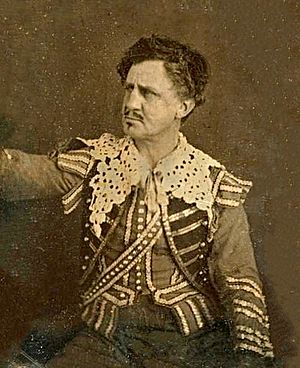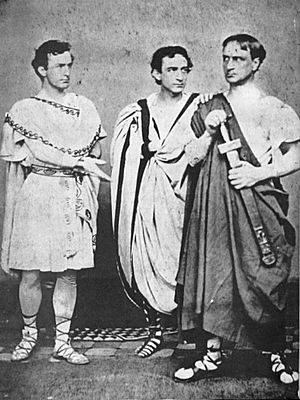Junius Brutus Booth facts for kids
Quick facts for kids
Junius Brutus Booth
|
|
|---|---|

Booth in c. 1850
|
|
| Born |
Junius Brutus Booth
1 May 1796 St. Pancras, London, England
|
| Died | 30 November 1852 (aged 56) vicinity of Louisville, Kentucky, U.S.
|
| Resting place | Green Mount Cemetery, Baltimore, Maryland, U.S. |
| Nationality | British |
| Occupation | Stage actor |
| Years active | 1814–1852 |
| Spouse(s) |
Marie Christine Adelaide Delannoy
(m. 1815; div. 1851)Mary Ann Holmes
(m. 1851) |
| Children | 12 including; Junius Jr., Edwin, Asia and John |
| Relatives | Edwina Booth Grossman (granddaughter) |
Junius Brutus Booth (born May 1, 1796 – died November 30, 1852) was a famous English stage actor. He was the father of actor John Wilkes Booth, who sadly assassinated U.S. President Abraham Lincoln. His other children included Edwin Booth, a leading actor of his time. His son Junius Brutus Booth Jr. became an actor and theatre manager. His daughter Asia Booth Clarke was a poet and writer.
Contents
Early Life and Acting Dreams
Junius Brutus Booth was born in St. Pancras, London, Great Britain. His father, Richard Booth, was a lawyer. Richard wanted his son to try many different jobs. Junius once said he was meant to be a printer, architect, sculptor, lawyer, or sailor. But he liked sculpting the most.
When he was 17, Booth became very interested in the theatre. He saw a play called Othello at the Covent Garden Theatre. The idea of becoming famous and free as an actor really appealed to him. He showed a natural talent for acting from a young age.
He started performing in small theatres across England. In 1814, he went on a tour to the Low Countries. The next year, he returned to London to make his first big performance there.
Becoming a Star Actor
Booth became well-known in England in 1817. This was after he played the main role in Richard III at the Covent Garden Theatre. Critics thought his acting was as good as Edmund Kean's. Kean was the top tragic actor in Britain at that time.
Fans of Booth and Kean sometimes argued at shows where both actors performed. But this did not stop them from acting together. Kean and Booth appeared in several Shakespeare plays at the Drury Lane Theatre from 1817 to 1821. Kean saw Booth as a rival. He tried to outshine Booth when they acted together.
Moving to the United States
In 1821, Booth moved to the United States with Mary Ann Holmes. She was a flower girl. They settled near Bel Air, Maryland in 1822. They lived in a log cabin that Booth bought. Later, he started building a bigger house called Tudor Hall. This house is now a historic landmark.
Booth quickly got a job playing Richard III in America. In less than a year, he became the most famous actor in the United States. One critic, William Winter, said people were amazed by him. His name created excitement that no one else could.
Booth had a 30-year acting career that made him famous across the country. He traveled to cities like Baltimore, Boston, and New York.
There is a story that Booth performed a play called Orestes in French in New Orleans. Some sources say this story is not true. However, Booth's daughter Asia said her father spoke French very well. Playbills from the time also show the play was in French.

Booth visited his home country of England for tours in 1825–1826 and 1836–1837. He took his whole family with him on the second trip. Sadly, one of his children, Henry Byron, passed away from smallpox during their stay. By 1831, Booth became the manager of the Adelphi Theatre in Baltimore.
His fame kept growing throughout his life. The famous writer Walt Whitman called him "the grandest actor of modern times."
In 1835, Booth wrote a letter to President Andrew Jackson. He asked the President to pardon two pirates. Later, it was confirmed that Booth had indeed written the letter. Booth apologized to Jackson, as they were friends. The "threat" was likely a misunderstanding or a joke.
Many years later, Booth’s son, John Wilkes, assassinated President Abraham Lincoln.
Later Life and Family
In 1852, Booth went on a tour of California with his sons Edwin and Junius Jr.. They performed in San Francisco and Sacramento. Heavy rains closed the theatres and caused food shortages. The Booths returned to San Francisco without earning any money. On October 1, he left San Francisco without his sons. Junius Jr. had already made his home there, and Edwin started acting on his own.
Booth had told his first wife, Marie Christine Adelaide Delannoy, that he would tour the United States for several years. He promised to send her money for her and their son, Richard. After some years, Booth stopped sending money regularly. So, his son Richard, who was 25, came to Baltimore. Richard eventually found out about Booth's American family. He told his mother, who came to Baltimore in 1846. She was able to divorce him in February 1851.
On May 10, 1851, Booth legally married Mary Ann Holmes. Their youngest child was 11 years old at the time.
Death
In 1852, Booth was traveling by steamboat from New Orleans to Cincinnati. He became very ill with a high fever. There was no doctor on the boat. He passed away on the steamboat near Louisville, Kentucky, on November 30, 1852. His wife, Mary Ann, traveled to Cincinnati alone to get his body.
Junius Brutus Booth is buried in Green Mount Cemetery in Baltimore.
Legacy
Junius Brutus Booth was honored after his death in 1981. He was inducted into the American Theatre Hall of Fame.
Screen Portrayals
- Robert Warwick played Junius Brutus Booth in The Farmer Takes a Wife (1935).
- Raymond Massey played Junius Brutus Booth in Prince of Players (1955).
Images for kids
-
Visitors to the Booth family plot often leave pennies, which depict Lincoln on the obverse, on the monument of John Wilkes Booth's father, Junius.
See also
- Booth family
 | Selma Burke |
 | Pauline Powell Burns |
 | Frederick J. Brown |
 | Robert Blackburn |



